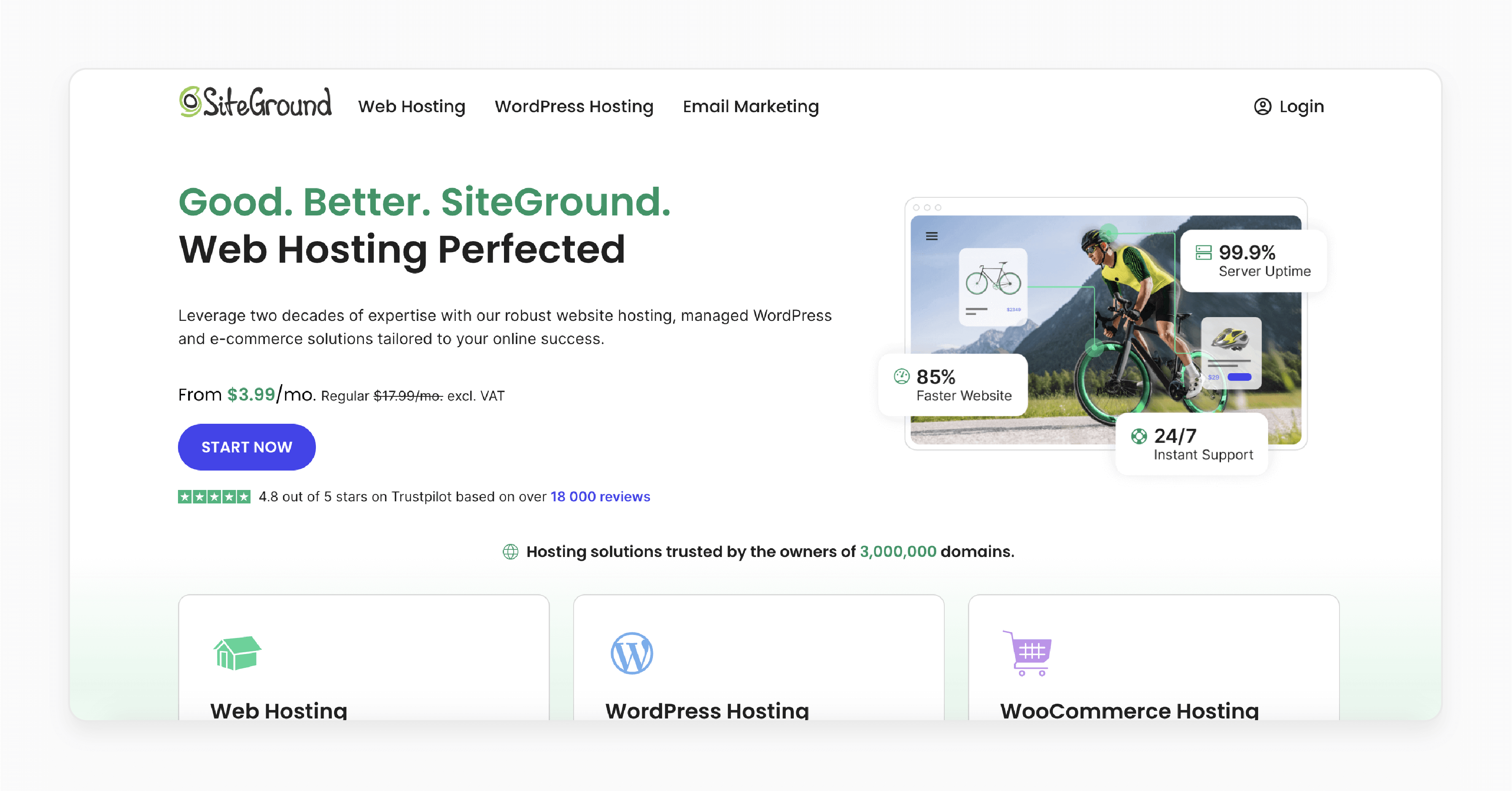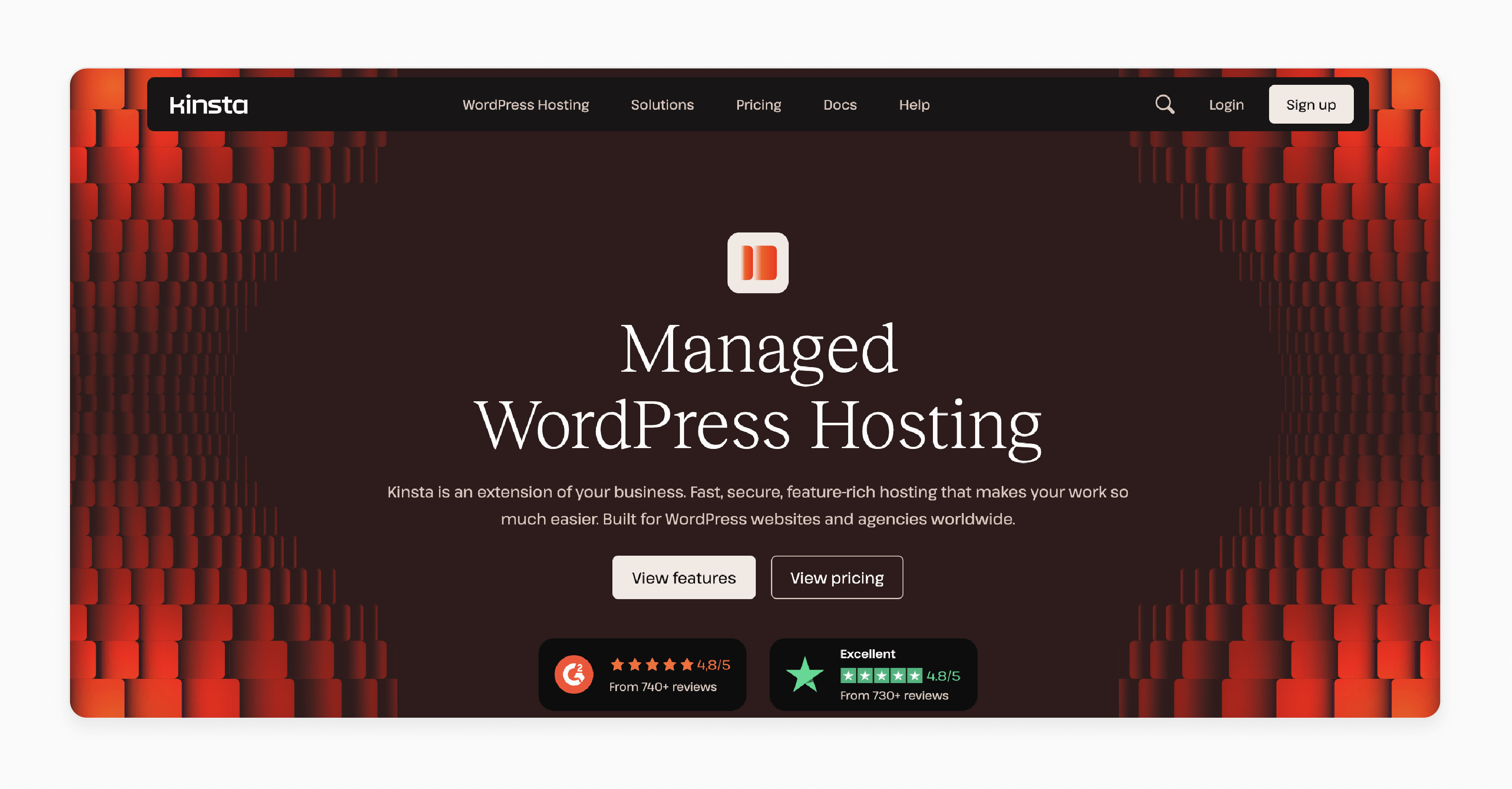
6 Best Wordpress Hosting For Ecommerce Site In 2024
Are you searching for the best WordPress hosting for your ecommerce site in 2024? Best WordPress Hosting for ecommerce ensures optimal performance and security. The right hosting provider enhances your website's speed, uptime, and scalability.
This article will cover how to select top WordPress hosting services for ecommerce websites.
Key Takeaways
-
Tailored server resources and technical support to optimize WordPress and Magento performance.
-
Options range from shared to dedicated hosting, each tailored to different ecommerce needs.
-
Features like automatic updates, caching, and CDNs improve site speed and reliability.
-
Comprehensive security measures, including SSL certificates and firewalls, protect against cyber threats.
-
Scalable hosting options accommodate traffic and business growth, ensuring sustainability.
-
Performance and Speed in Best WordPress Hosting for E-commerce
-
How Do Caching And CDNs Optimize WordPress Hosting For E-commerce?
-
SSL Certificates and Firewalls in Best WordPress Hosting for E-commerce
-
6 Best WordPress Hosting Providers Of 2024 for E-commerce Platform
Importance of WordPress Hosting for E-commerce
WordPress hosting is a specialized service tailored for websites built on the WordPress platform. It provides the necessary server resources to run WordPress-based sites efficiently. It also offers technical support for these sites, which can significantly impact,
-
Website performance
-
Security
-
Overall user experience
E-commerce success relies heavily on website speed. Web host providers optimize systems for WP hosting, ensuring faster load times that are necessary for reducing bounce rates. It also helps improve conversion rates. Both benefits apply to online stores.
Many WP Hosting platforms offer plans optimized for WooCommerce, which is a popular digital commerce plugin. These optimized plans ensure better compatibility for online stores. They also improve the performance of stores built with WordPress and WooCommerce.
Investing in quality WP Hosting can be beneficial and provide a solid foundation. This foundation supports digital commerce success and enables businesses to focus on growth. It also allows them to prioritize customer satisfaction. This approach helps companies avoid getting bogged down by technical challenges.
Types of WordPress Hosting for eCommerce
1. Shared WordPress Hosting
Shared hosting is a popular entry-level option. Multiple websites share resources on a single server. This type of hosting is often the most affordable. It is suitable for small web hosting sites or new online stores.
Features of shared WP Hosting include:
-
Cost-effective pricing, making it accessible for small businesses.
-
One-click WP Hosting installation for easy setup.
-
Basic security features often include a free SSL certificate.
-
Limited server resources, which may affect site performance during traffic spikes.
-
Suitable for standard WP Hosting sites and essential WooCommerce stores.
-
Often includes a user-friendly control panel for website management.
-
It has restrictions on plugin usage and customization options.
2. Managed WordPress Hosting
Managed WP Hosting is a specialized service optimized specifically for WP Hosting websites. This option is ideal for growing Online Commerce stores. It provides enhanced performance. It also offers improved security.
Features of managed WP Hosting include:
-
Automatic WordPress core updates and security patches.
-
Advanced security measures, including malware scanning and removal.
-
Optimized system configurations for improved WP Hosting performance.
-
Expert WP Hosting support from the hosting provider.
-
Often includes staging environments for testing updates.
-
Regular backups and easy restore options.
-
Some providers offer WooCommerce-specific managed hosting plans.
-
It provides performance optimization tools like caching and CDN integration.
3. VPS (Virtual Private Server) Hosting
VPS hosting provides a virtual server environment. It offers dedicated resources. It creates a balance between multi-user hosting and a dedicated server. It's suitable for medium-sized online commerce sites that require more control and resources.
Features of VPS hosting for WordPress include:
-
Allocated server resources not shared with other users
-
Greater control over system configuration and software installation
-
Scalability to adjust resources as your Online Commerce site grows
-
Improved performance compared to shared hosting
-
Root access for advanced users (in unmanaged VPS plans)
-
Ability to host multiple WP Hosting sites on one VPS
-
Often more cost-effective than dedicated hosting
4. Cloud WordPress Hosting
Cloud hosting utilizes a network of connected servers to host websites. It offers high scalability and reliability. This option is ideal for larger eCommerce stores. It's also suitable for those with variable traffic patterns.
Features of cloud WP Hosting include:
-
Highly scalable resources to handle traffic spikes
-
Improved uptime due to distributed server architecture
-
Pay-as-you-go pricing models for cost flexibility
-
Automatic failover to prevent downtime
-
Geographically distributed data centers for faster global access
-
Often includes integrated CDN services
-
Suitable for high-traffic WooCommerce stores
5. Dedicated WordPress Hosting
Dedicated hosting provides an entire physical server exclusively for one website. This premium option offers maximum performance and control. It is suitable for large, high-traffic online commerce sites.
Features of dedicated WP Hosting include:
-
Complete server resources dedicated to your WP Hosting site
-
Maximum customization and configuration options
-
Highest level of performance for resource-intensive eCommerce sites
-
Advanced security options and compliance features
-
Ability to handle very high traffic volumes
-
Often includes managed services for system maintenance
-
Suitable for enterprise-level WooCommerce stores
6. WooCommerce-Specific Hosting
Some hosting providers offer specialized plans. These plans are tailored for WooCommerce. WooCommerce is a popular eCommerce plugin. It is designed for WordPress. These plans are optimized for online stores built with WP Hosting and WooCommerce.
Features of WooCommerce-specific hosting include:
-
Pre-installed and pre-configured WooCommerce
-
Optimized system settings for Online Commerce performance
-
Specialized support for WooCommerce-related issues
-
Often includes online commerce-specific security features
-
May offer tools for easy product imports and migrations
-
Scalable plans to accommodate growing online stores
-
It includes premium WooCommerce extensions
7. EasyWP
EasyWP is Namecheap’s managed WordPress hosting service, specifically optimized for WordPress websites and designed for simplicity and speed. It is particularly suited for beginners and those seeking a hassle-free, affordable hosting solution for their ecommerce or content-driven sites.
Key features:
- Fast load times and reliable performance with SSD storage and Namecheap’s cloud technology.
- Free SSL certificate and CDN included.
- One-click backup and restore from an easy-to-use dashboard.
- Plans offer 10 GB to 100 GB SSD storage and support 50,000 to 500,000 monthly visitors.
- Simple dashboard shows site health, stats, and tools—great for beginners.
- 24/7 customer support by live chat and email.
Performance and Speed in Best WordPress Hosting for E-commerce
1. Choosing the Right Hosting Plan
Selecting an appropriate hosting plan is necessary for e-commerce success. Website owners should assess their needs carefully. This assessment should be based on expected traffic volumes. It should also consider the number of products they offer. Multi-user hosting plans may suffice for small digital commerce stores. However, larger businesses often benefit from managed WP Hosting or VPS solutions. These provide more resources and better performance.
2. WordPress and Plugin Management
Keeping WP Hosting core files updated is essential. Maintaining updated plugins is also necessary. These practices help maintain optimal performance. Regular updates often include speed improvements and security patches. E-commerce site owners should also regularly audit their plugins. They should remove any that are unused or redundant to reduce system load.
3. Image Optimization
Product images play an essential role in digital commerce. However, they can significantly impact site speed if not optimized. Implementing image compression techniques without sacrificing quality is necessary. Many hosting providers offer built-in image optimization tools. Alternatively, website owners can use WP Hosting plugins designed for this purpose.
4. Code Optimization
Minifying CSS, JavaScript, and HTML can significantly improve load times. It is achieved by reducing file sizes. Implementing lazy loading for images and content can also help. It enhances the initial page load speed. It is achieved by deferring the loading of off-screen elements until they're needed.
5. Theme Selection
Choosing a lightweight, performance-optimized theme is necessary for e-commerce sites. Multipurpose themes offer flexibility. However, they often come with unnecessary features that can slow down a website. Many hosting providers provide optimized themes. They may also recommend digital commerce-specific themes that balance functionality and performance.
How Do Caching And CDNs Optimize WordPress Hosting For E-commerce?
1. Caching Mechanisms
Caching improves e-commerce site performance. It involves storing frequently accessed data for quicker retrieval. It reduces system load and improves response times. The best WP hosting providers offer multiple levels of caching. These include
-
Browser caching
-
Server-side caching
-
Object caching (such as Redis)
Many also provide built-in caching solutions. These are optimized for digital commerce platforms.
2. Content Delivery Networks (CDNs)
CDNs significantly enhance the global performance of digital commerce sites. They do this by distributing content across multiple servers worldwide. This approach reduces latency. It serves content from the server closest to the user. Many top hosting providers integrate CDN services into their hosting plans.
Security Features in Best WP Hosting for E-commerce
1. Regular software updates
-
Keep WordPress core, themes, and plugins updated to the latest versions
-
Apply security patches promptly to address known vulnerabilities
-
Set up automatic updates where possible to ensure timely protection
2. Strong password policies
-
Enforce complex passwords for all user accounts, including customers
-
Implement password expiration and regular change requirements
-
Use password managers to generate and store secure passwords
3. Limited login attempts
-
Restrict the number of failed login attempts to prevent brute force attacks
-
Implement temporary account lockouts after multiple failed attempts
-
Use CAPTCHA or other verification methods to prevent automated attacks
4. User roles and permissions
-
Assign appropriate access levels to different users based on their needs
-
Limit admin privileges to essential personnel only
-
Regularly audit user accounts and remove unnecessary access
5. Security plugins
-
Install reputable WordPress security plugins to enhance built-in features
-
Use plugins for additional functions like activity logging and file integrity monitoring
-
Keep security plugins updated and properly configured
6. Regular security audits
-
Conduct periodic security assessments to identify potential vulnerabilities
-
Use both automated tools and manual testing for comprehensive audits
-
Address identified issues promptly to maintain a secure environment
7. PCI DSS compliance
-
Ensure compliance with Payment Card Industry Data Security Standards
-
Implement necessary measures to protect customer payment information
-
Regularly assess and update compliance measures as standards evolve
SSL Certificates and Firewalls in Best WordPress Hosting for E-commerce
1. SSL Certificates
Secure Certificates are necessary for digital commerce websites. They offer the following benefits:
-
Encrypt data transmitted between the website and users
-
Build trust with customers by displaying security indicators
-
Improve search engine rankings, as SSL is a ranking factor
Top hosting providers offer various types of SSL certificates:
1. Free SSL certificates:
-
Automated installation and renewal
-
Suitable for basic digital commerce needs
-
e.g., Let's Encrypt
2. Domain Validated (DV) SSL:
-
Quick validation process
-
Encrypts data and displays the padlock icon
3. Organization Validated (OV) SSL:
-
Includes business verification
-
Provides stronger trust signals to customers
4. Extended Validation (EV) SSL:
-
Highest level of validation and trust
-
Displays the company name in the browser address bar
2. Firewalls
Firewalls are another critical security component. The best hosting providers offer:
1. Web Application Firewall (WAF):
-
Protects against application-layer attacks
-
Filters malicious traffic before it reaches the website
-
Regularly updated to defend against new threats
2. Network firewalls:
-
Monitors and controls incoming and outgoing network traffic
-
Provides an additional layer of security at the server level
-
Helps prevent unauthorized access to the hosting environment
3. Cloud-based firewalls:
-
Offers distributed protection against various threats
-
Often included in CDN services provided by hosting companies
-
Scalable to handle large volumes of traffic and attack attempts
6 Best WordPress Hosting Providers Of 2024 for E-commerce Platform
1. SiteGround

SiteGround is a highly regarded hosting provider for WordPress website and WooCommerce. They offer optimized hosting solutions for digital commerce websites.
Key features:
-
Fast performance with SSD storage and custom system setups
-
Free WordPress installation and migration
-
Daily backups and free SSL certificates
-
24/7 customer support with WP Hosting expertise
-
Staging environment for testing updates
-
WooCommerce-specific plans available
2. Bluehost

Bluehost is known for its user-friendly interface and affordable hosting plans. They are an official WordPress.org recommended hosting provider.
Key features:
-
One-click WordPress installation
-
Free domain name for the first year
-
24/7 support via phone, email, and chat
-
Unmetered bandwidth on all plans
-
Basic WooCommerce features included in some plans
3. WPEngine

WPEngine specializes in managed WP Hosting. They offer high-performance hosting services tailored for Digital Commerce websites.
Key features:
-
Automated WordPress updates and daily backups
-
Advanced security features and malware protection
-
Staging environments for all plans
-
CDN is included with all hosting packages
-
Dedicated WooCommerce hosting plans
-
24/7 expert WP Hosting support
4. DreamHost

DreamHost provides reliable WP Hosting with a focus on performance and security. They offer a variety of hosting options for different needs.
Key features:
-
100% uptime guarantee
-
Free domain name and privacy protection
-
Automated WordPress updates
-
Custom control panel for easy management
-
WooCommerce-optimized plans available
5. Kinsta

Kinsta is a premium managed WP Hosting provider. It uses Google Cloud Platform's infrastructure. They offer high-performance hosting for digital commerce websites.
Key features:
-
Auto-scaling cloud hosting
-
Free site migrations
-
Staging environments for all plans
-
Advanced security measures
-
24/7 expert support
6. Flywheel

Flywheel specializes in managed WP Hosting. They focus on design agencies and freelancers. They offer hosting solutions suitable for digital commerce websites.
Key features:
-
Custom-built caching system for fast performance
-
Nightly backups and easy restore options
-
Collaboration tools for teams
-
Staging sites for all plans
-
24/7 expert WordPress support
7. Atlantic.Net
Trusted by businesses for over 31 years, Atlantic.Net is a seasoned hosting provider known for secure, high-performance infrastructure and exceptional customer service. Their WordPress VPS hosting is built for speed, scalability, and compliance—making it a strong choice for e-commerce platforms.
- Free 8GB VPS server for one year, ideal for launching or scaling WordPress stores.
- Fast setup with SSD storage and deployment in under 30 seconds.
- Built for growth, with scalable plans and developer-friendly tools.
- Security-first hosting, supporting PCI and HIPAA compliance with optional managed services.
- 100% uptime SLA backed by redundant infrastructure.
- Always-available U.S.-based phone support, ensuring help is just a call away.
- No long-term contracts, offering flexibility for evolving business needs.
FAQs
1. What should I look for when choosing the best e-commerce WordPress hosting provider?
When choosing the best WP Hosting provider for an online commerce site, consider several factors. These include speed, uptime, customer support, and scalability. It's also essential to ensure that the hosting service offers features optimized for WP Hosting. Look for support for online commerce platforms like WooCommerce as well. Reading hosting reviews can also help you make an informed decision.
2. How do I know which hosting plan is right for my ecommerce website?
The right website hosting plan for your ecommerce website depends on several factors. These include your site's size. They also include your site's traffic. Your specific needs are another important consideration. For small to medium-sized businesses, managed WooCommerce hosting plans are often ideal. For more significant sites, cloud hosting or a dedicated server may be more suitable. Compare different WP hosting plans to find one that aligns with your requirements.
3. What are the benefits of using ecommerce hosting?
Ecommerce hosting offers several benefits. These include enhanced security, better performance, and specialized support for online stores. Such hosting services are optimized to handle high traffic volumes and transactions. It ensures a smooth shopping experience for customers. It can significantly contribute to your online commerce success.
4. How does cloud hosting benefit an ecommerce site?
Cloud hosting offers various benefits for an online commerce site. These include scalability, reliability, and improved performance. It allows your online business to handle sudden traffic spikes. Cloud hosting also offers a pay-as-you-go pricing model. If you're looking for the best WP Hosting, cloud hosting can be a strong contender.
5. Can I install WordPress myself, or do I need a hosting service to do it?
You can install WordPress yourself. However, most hosting services offer a one-click installation feature. It simplifies the process. If you're new to WP Hosting, you might find it easier to use a hosting provider with certain features. Look for one that offers one-click installation. Also, seek comprehensive support.
6. Are shared hosting plans sufficient for an ecommerce website?
Shared hosting plans might be sufficient for small websites or new WordPress sites with low traffic. However, for online commerce sites, better hosting options are generally recommended. These include services that offer improved performance and security. Examples are managed WooCommerce hosting or cloud hosting. These options might be more expensive than multi-user hosting. But they provide the reliability needed for online commerce success.
7. Is business email included in most wordpress hosting plans?
Many WP Hosting plans include business email services as part of their packages. It allows you to have a professional email address. It will be associated with your online commerce website. Always check what features are included in the hosting plans.
Summary
Choosing the best WordPress hosting for ecommerce websites ensures optimal performance and security. This type of hosting is designed for WordPress-based sites. It meets their unique needs. Here's a concise recap of the best WordPress hosting options:
-
Shared WordPress Hosting: Ideal for newcomers. Offers easy setups and essential security for small sites.
-
Managed WordPress Hosting: Targets businesses experiencing growth. Provides powerful support and enhanced security measures.
-
VPS Hosting: Best for medium-sized stores. This option delivers dedicated resources with more customization control.
-
Cloud Hosting: Excellent for large ecommerce sites with variable traffic. It provides outstanding scalability and reliability.
-
Dedicated Hosting: The premier choice for high-traffic sites. It offers the highest performance and exclusive server use.
-
WooCommerce-Specific Hosting: Tailored for WooCommerce sites to ensure optimal performance and expert support.
Explore managed Magento hosting services to improve performance for your Wordpress hosting platform.









